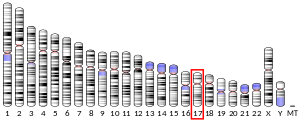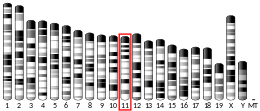FAM20A
FAM20A is a protein that in humans is encoded by the FAM20A gene.[5]
Function
FAM20A belongs to an evolutionarily conserved family of secreted proteins expressed in many tissues. This locus encodes a protein that is likely secreted and may function in hematopoiesis.[6] A mutation at this locus has been associated with amelogenesis imperfecta and gingival hyperplasia syndrome. Alternatively spliced transcript variants have been identified. [provided by RefSeq, Aug 2011]
Clinical significance
A mutation in FAM20A was reported to be associated with amelogenesis imperfecta, an inherited enamel defect, and gingival hyperplasia syndrome.[7]
Human mutations in FAM20A were also reported to cause Enamel-Renal Syndrome, an autosomal recessive disorder characterized by severe enamel hypoplasia, failed tooth eruption, intrapulpal calcifications, enlarged gingiva, and nephrocalcinosis.[8]
References
- GRCh38: Ensembl release 89: ENSG00000108950 - Ensembl, May 2017
- GRCm38: Ensembl release 89: ENSMUSG00000020614 - Ensembl, May 2017
- "Human PubMed Reference:". National Center for Biotechnology Information, U.S. National Library of Medicine.
- "Mouse PubMed Reference:". National Center for Biotechnology Information, U.S. National Library of Medicine.
- "Entrez Gene: family with sequence similarity 20".
- Nalbant D, Youn H, Nalbant SI, Sharma S, Cobos E, Beale EG, Du Y, Williams SC (2005). "FAM20: an evolutionarily conserved family of secreted proteins expressed in hematopoietic cells". BMC Genomics. 6 (1): 11. doi:10.1186/1471-2164-6-11. PMC 548683. PMID 15676076.
- O'Sullivan J, Bitu CC, Daly SB, Urquhart JE, Barron MJ, Bhaskar SS, Martelli-Júnior H, dos Santos Neto PE, Mansilla MA, Murray JC, Coletta RD, Black GC, Dixon MJ (May 2011). "Whole-Exome sequencing identifies FAM20A mutations as a cause of amelogenesis imperfecta and gingival hyperplasia syndrome". Am. J. Hum. Genet. 88 (5): 616–20. doi:10.1016/j.ajhg.2011.04.005. PMC 3146735. PMID 21549343.
- Wang SK, Aref P, Hu Y, Milkovich RN, Simmer JP, El-Khateeb M, Daggag H, Baqain ZH, Hu JC (Feb 2013). "FAM20A mutations can cause enamel-renal syndrome (ERS)". PLOS Genet. 9 (2): e1003302. doi:10.1371/journal.pgen.1003302. PMC 3585120. PMID 23468644.



